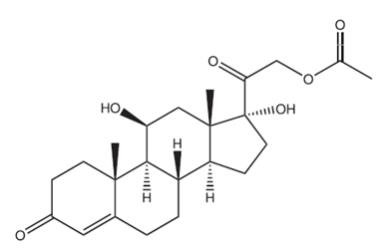Hemmorex-HC
Generic name:hydrocortisone acetate
Dosage form: suppository
Drug class:Topical steroids
Medically reviewed by Drugs.com. Last updated on Jul 1, 2021.
Disclaimer: This drug has not been found by FDA to be safe and effective, and this labeling has not been approved by FDA. Read further information about unapproved drugs.
On This Page
Hemmorex-HC™
(hydrocortisone acetate suppositories), 25mg
Rx Only
For Rectal Administration
DESCRIPTION:
Hydrocortisone acetate is a corticosteroid designed chemically as pregn-4-ene 3, 20-dione, 21-(acetyloxy)-11, 17-dihydroxy––(11 β) with the following structural formula:

Each rectal suppository contains hydrocortisone acetate, USP 25 mg in a specially blended hydrogenated vegetable oil base.
CLINICAL PHARMACOLOGY:
In normal subjects, about 26% of hydrocortisone acetate is absorbed when the suppository is applied to the rectum. Absorption of hydrocortisone acetate may vary across abraded or inflamed surfaces. Topical steroids are primarily effective because of their anti-inflammatory, anti-pruritic and vasoconstrictive action.
INDICATIONS AND USAGE:
Hemmorex-HC™ suppositories are indicated for use in inflamed hemorrhoids, post-irradiation (factitial) proctitis; as an adjunct in the treatment of chronic ulcerative colitis; cryptitis; and other inflammatory conditions of anorectum and pruritus ani.
CONTRAINDICATIONS:
Hemmorex-HC™ suppositories are contraindicated in those patients having a history of hypersensitivity to hydrocortisone acetate or any of the components.
PRECAUTIONS:
Do not use Hemmorex-HC™ suppositories unless adequate proctologic examination is made. If irritation develops, the product should be discontinued and appropriate therapy instituted. In the presence of an infection, the use of an appropriate antifungal or antibacterial agent should be instituted. If a favorable response does not occur promptly, Hemmorex-HC™ should be discontinued until the infection has been adequately controlled.
Carcinogenesis:
No long term studies in animals have been performed to evalua.



